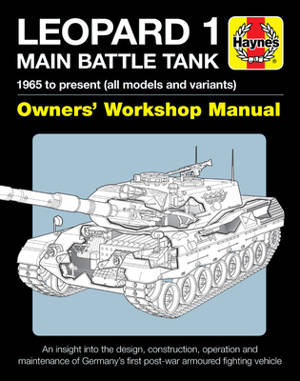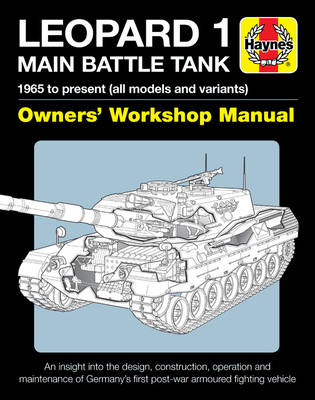
- Afhalen na 1 uur in een winkel met voorraad
- Gratis thuislevering in België vanaf € 30
- Ruim aanbod met 7 miljoen producten
- Afhalen na 1 uur in een winkel met voorraad
- Gratis thuislevering in België vanaf € 30
- Ruim aanbod met 7 miljoen producten
Zoeken
Leopard 1 Main Battle Tank Owners' Workshop Manual
1965 to Present (All Models and Variants) - An Insight Into the Design, Construction, Operation and Maintenance of Germany's First Post-War Armoured Fighting Vehicle
Michael Shackleton, Michael K Cecil
€ 34,95
+ 69 punten
Omschrijving
Following the re-integration of West Germany into NATO in the mid-1950s, the Bundeswehr was equipped with American tanks under the Military Aid Program. Quickly realising they were not suitable, Germany began the design of their own main battle tank in 1956. The Leopard 1 family of vehicles became the first fully-German developed series of armoured combat vehicles to be built after the Second World War, and it owes much to the design concepts developed through combat experience during the latter stages of that war. Using the German-built version of the British L7 105mm gun for its main armament, the Leopard focused on firepower and with its impressive cross-country performance it was unmatched by most other tank designs of the era. The first production Leopard 1 left the line in September 1965 and since then Leopards have seen operational service in Afghanistan (Canadian Leopard C2 MEXAS), Bosnia and Croatia (UNPROFOR Danish Leopard 1A5-DK MBT), Kosovo (KFOR: Danish 1A5-DK; Canadian C1 and Italian 1A5), and Somalia (UNOSOM German Bergpanzer and Pionierpanzer). In 2003 the German Army relinquished its Leopard 1s, and in 2011 the Canadian Battle Group withdrew its Leopard 1s from Afghanistan.
Specificaties
Betrokkenen
- Auteur(s):
- Uitgeverij:
Inhoud
- Aantal bladzijden:
- 188
- Taal:
- Engels
- Reeks:
Eigenschappen
- Productcode (EAN):
- 9781785216374
- Verschijningsdatum:
- 3/03/2020
- Uitvoering:
- Hardcover
- Formaat:
- Genaaid
- Afmetingen:
- 220 mm x 278 mm
- Gewicht:
- 825 g

Alleen bij Standaard Boekhandel
+ 69 punten op je klantenkaart van Standaard Boekhandel
Beoordelingen
We publiceren alleen reviews die voldoen aan de voorwaarden voor reviews. Bekijk onze voorwaarden voor reviews.











